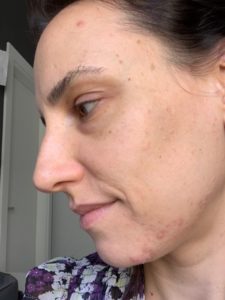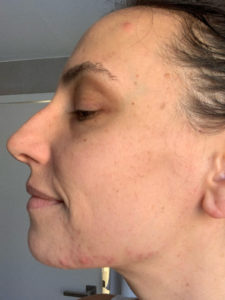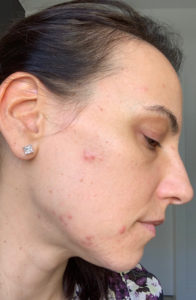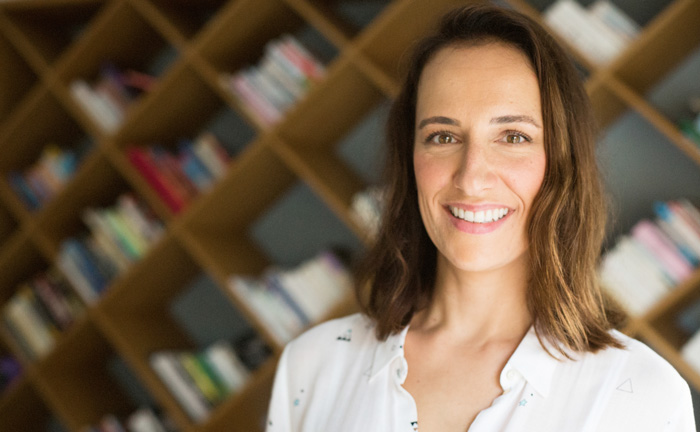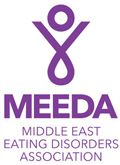Last year was quite a challenging one for me on the mental health front. So much so that I couldn’t resolve myself to share my struggles with you earlier. Whether it was out of embarrassment, because I was feeling like a [‘skin positive’] fraud or by fear of triggering other people, I will never know.
But as I spent more time reflecting on 2019, I also noticed a strong need to truly open up about these difficulties. I crave transparency after a year that, despite many business and personal successes, felt really lonely, anxious and insecure on a more personal level.
I also need to – sheepishly – recognize that acute self-awareness doesn’t always prevent you from a potential relapse. I could beat myself up over this, but I am taking the self-compassion route and simply focus on putting one foot in front of the other. I also hope you’ll be able to find it in you to offer myself compassion too. But evidently, if you don’t and are disappointed in me for not sharing the below before, I would understand it too.
Ok, let’s do this.
I spent the end of 2018 plagued with more cystic acne than ever. At 38, it was painful, depressing, exhausting, embarrassing. Especially because I had imagined, in my innocent little brain, that recovering fully from disordered eating (which I had worked hard on since May 2016) would somehow finally balance the hormones I had neglected for years and allow my skin to go back to its reasonably unblemished state, the one I was in before falling prey to the sneaky messages of diet culture. Don’t get me wrong, my expectations were not to have ‘perfect’ skin (also because I am convinced that it doesn’t truly exist – maybe only on a handful of lucky individuals). No, I was simply hoping for my skin to find its balance, and to be free from constant pain, inflammation, swelling and bleeding. At 38, it seemed like a reasonable demand.
And I know some of you will see the image below and think ‘this? this is nothing! Other people have it much worse!’ And you’ll be right. I mean, there is always worse, right? But if you have ever faced acne even for a short period of time, you know it is actually very traumatic. (some even evoke a response close to PTSD, see this interesting experiment). Also, I have been living on and off with acne since I am thirteen. That is over a quarter of a century of lotions and masks, of elimination diets and gut health protocols (leading to orthorexia), of waking up and immediately ‘feeling’ for potential new cysts brewing, of concealing and covering, of picking and then hating yourself for it, of removing your make up and bleeding from several places every night, of crying during medical facials, of deciding not to speak up in meetings or not to join social events just because you are conscious about a huge pimple on your face or will be in a position where you’ll have to show a bare, make-up free face. Overtime, it is really taxing. In my case, acne is also directly related to my disordered eating behaviours. As in, the main trigger for those has never so much been about losing weight, as it was about clearing my skin. Heck, I had to get on Accutane to start working on recovery, because I had grown so scared of foods that presumably triggered breakouts. And I realise that by now, 39 yo, I am absolutely even more traumatised by spots than I was at a younger age. Something about the repetitive return of it despite all my efforts, and something about this socially accepted misconception that acne should only happen when you’re young or is a sign of neglect and filth.
At the time this photo was taken though, I was eating more intuitively than ever and accepting my body’s weight and shape fluctuations completely, but the one big trigger of my eating disorder was back: I had constant, throbbing, inflamed pores all across my jaws. The topical regimen I had been successfully using stopped working (if you have never used acne products: your skin goes through phases where they don’t work anymore and you need to stay off for a while before they can be effective again) and I was finding myself in a miserable place again, slapping on tons of make-up to cover up white heads and deep painful cysts scattered across my face. Inside, the constant chatter was back: “oh no, I can feel another cyst brewing right there…what will people think? will i have acne until I DIE? How can I be taken seriously with these across my face? Will the big pimple on my chin pop if i laugh out loud? If someone makes a comment about it, I swear I will burst into tears.”
For some unknown reason, I immediately forbid myself to go back on Accutane (something about our culture’s chronic, debilitating fear of medication, and the moral value constantly given to the ‘healthy/natural’ route, EVEN when it is destroying emotional health – clearly, I’ll need a separate post on this) and kept bumping into online ads for a programme promoting to reach ‘total inactivation’ of adult acne for all. I resisted it for months (I am generally extra cautious of aggressive online ads – point in case, i should have trusted my gut feeling and stayed away) but then decided to just book their free call to know what it was about and understanding if a past of disordered eating was not preventing me from entering. Their marketing tactics were absolutely awful and I left the ‘info session’ with no real information but extra pressure to pay and confirm. I was also told being a former disordered eater would NOT preventing me from joining this program. That it would be safe for me to join. I wanted to know what the big secret was. I wanted out of those difficult feelings. So I decided to join, to give myself one last chance to try this ‘inactivation’ thing, over the course of 2019.
At first, it started well. I was joining an online community of fellow acne sufferers, and it was somehow nice to know I was not ‘alone’ in my struggles. I was also trained in a new skincare routine, which was a lot simpler and straightforward than my former complicated, multi-step one. But then came the diet. And it was horrifyingly restrictive.
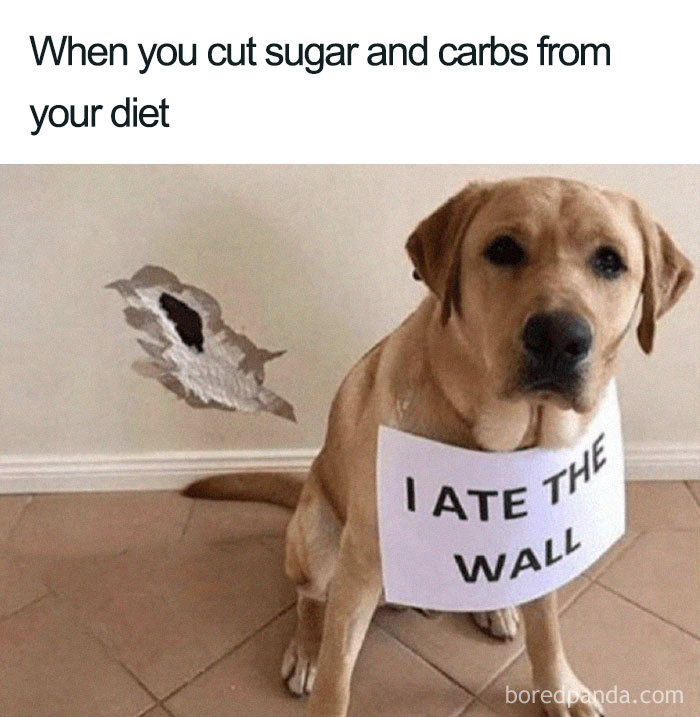
Apparently, getting rid of acne meant being on (yet another) elimination diet. If you don’t know elimination diets, it means getting rid of ALL potential allergens over a definite period of time (except here, nothing was definite, because your skin improvements would signal to start reintroduction), in an attempt to slowly reintroducing them one by one and to figure out which ones are the true culprits causing your issues. I won’t go into details, but it was just as restrictive as in my worse disordered eating days. Oh, and we were told to meticulously write down what we ate, and share it on a weekly basis with the organisers, who could then, identify potential new foods to remove from our already limited diet, or congratulate us for being super restrictive. HELLO EATING DISORDER BEHAVIOURS!
But the worse part is this: I actually went for it.[huge cringe]
Despite knowing so much about dieting’s harmful effects
Despite failing ALL my previous elimination diets attempts
Despite understanding that eliminating foods is what left me with chronic digestive discomfort
Despite testing negative on food allergies a year prior to that
Despite running a business and having values that are RUTHLESSLY ANTI-DIET…

I fell for the dream of clear skin. The unicorn that is ‘successfully treating oneself without meds’. The fallacy of ‘it’s not about my weight, it’s about health’.
And I jumped on board the merry-go-round once again. Not without reluctance. Not without thinking ‘this feels really wrong and uncomfortable’. Not without fear. But still, I couldn’t help myself.
Maybe it was because I had already paid to enter the programme. Maybe it was curiosity. Maybe it was the ‘what if?’ in my head thinking this time things will be different because I was ‘recovered’ (hello, magical thinking).
I found myself slowly sneaking into the elimination diet steps. Sneaking is the right word, because I couldn’t be open about it. Friends and families would have been concerned about a potential relapse (they would have been right). And at work, it felt like this huge cognitive dissonance to preach HAES and Intuitive Eating while surviving on only a handful of ‘allowed’ foods at home. Not to mention that I usually make a point to model balanced eating to my kids…and now had to prepare separate meals.
Needless to say, from the minute I started, I deeply regretted it.
The high of the first few days or weeks (‘I can totally do this! I already feel so much better! I should have done this a lot earlier’) quickly lead to the unwelcome weight loss, the weak, low-energy feels, the hangry, miserable evenings out, spent trying to (unofficially) avoid what everyone else at the party wishes to eat. Also, it quickly became clear to me that the ‘total inactivation’ promised could only be maintained by…following this diet 80% of the time. For. the. rest. of. your. life. Hell, no!
Despite being mostly acne free, the whole year has been a massive challenge emotionally and physically because of the constant dichotomy I felt about this life decision. For applying principles in my personal life that I would not recommend to my clients, or even my family members! For feeling I was unable to share openly (even with my closest circle). For falling back in the shameful, lonely, sad, anxious place of restrained eating. There were improvements skin wise, especially after I was given hormonal supplementation (proof that it is not all in the food), but this programme was killing me inside because I was not living in accordance to my core life values.
Long story short, after a few months on the crazy diet, and feeling like a failure for constantly munching on ‘non-allowed’ foods (because – FOOD IS LIFE) and therefore defeating the whole elimination purpose, I stopped sleeping. My anxiety went through the roof and I ended up in my therapist’s office. She strongly advised for me to stop the dieting, by fear of a relapse. She also rightly reminded me that stress cannot be positive for people with skin conditions. (Duh! I knew that too)
At that time, I cried. I cried to my husband. I cried to my friends. I cried on my own. I cried of frustration. I cried of anger. I cried of injustice. There were a whole bunch of tears.
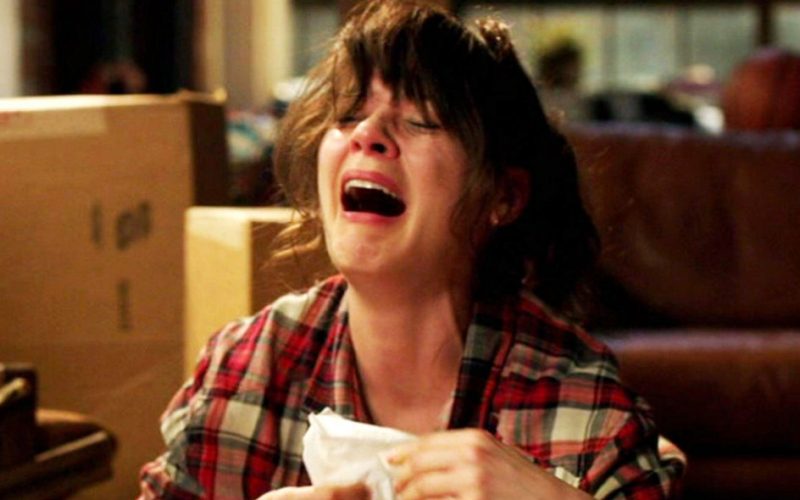
Until I finally got to see there was only one thing I needed to do for my skin. And it was letting go of the dream of making it ‘better’ through eliminating foods I love.
That crazy dream lead me to disordered eating. It messed with my emotional and mental health. It destroyed my self-esteem. It disconnected me from the people I love the most. It harmed my health through constant yo-yo dieting. And it only lead me to unsustainable solutions, and, eventually, MORE hormonal imbalances, MORE digestive difficulties, MORE negative self-talk, MORE acne. Overall, the balance was negative.
As I am sharing this, and looking into non-food based options to find acne relief in a sustainable, COMPASSIONATE, non harmful, joyful way, I hope this post is a good reminder to you that
1/ Diets are sneaky
Whether you seek weight loss or not, if a ‘plan’ or a ‘programme’ has a list of do’s and don’t’s and if you are seen as ‘morally superior’ for following the rules, it is a diet. And if you have a history of restriction, you ought to be extra cautious of getting into ANY sort of dieting or elimination, or about writing down what you eat, about joining people that are obviously dieting and seeing higher moral value in it. If for whatever reason you decide to modify your eating habits and quickly this is making you anxious or uneasy, that extra stress is most likely counter-productive for the condition you try to attend to. Not being able to follow the diet doesn’t make you a ‘bad’ human. Remember our bodies are hardwired to resist restriction and fight it physically and mentally. PS: Having said that, if avoiding certain foods works for your skin and doesn’t make you batshit crazy, go for it: you do you.
2/ Medications are not shameful
Taking medication or seeking therapy when you live with chronic health conditions – whether or not they are considered ‘bad enough’ from an outside perspective – is not SHAMEFUL. Considering the individual in a holistic mind-body connection way, with their medical history and individual (mental) needs and allow for more embodiment, for a feeling of positive connection to the body and its symptoms, IS a good health practice. My future might involve to take acne meds (like Accutane), or not, I might go through phases where my skin issues are less of a mental health struggle, and some phases where being skin positive bears really too heavy on my shoulders. What 2019 taught me is the importance of fostering that connection to the body and its sensations, by taking it one step at a time, doing what FEELS good, for my skin, but also and mostly for my heart and my head.
3/ Coaches and health practitioners go through their own challenges
The reality is: none of us are fully ‘there’, because there is no ‘there’! We are all constantly evolving and progressing and realising new truths (or, sometimes, going backward – remember this is normal. Life is far from a linear path). Having said this, I don’t believe this episode of my personal, intimate life stopped me from supporting clients in their own recovery journey. Witnessing them, listening to them and allowing them to grow, to feel seen and heard was an absolute joy and if anything, it offered massive relief from my personal struggles.
If you read all the way down to here, thanks for being here with me, I really appreciate it.
Here is to 2020 being about surrendering, letting go of magical thinking, pursuing the dreams that are in agreement with our gut feeling, while truly honouring our physical and mental needs.

